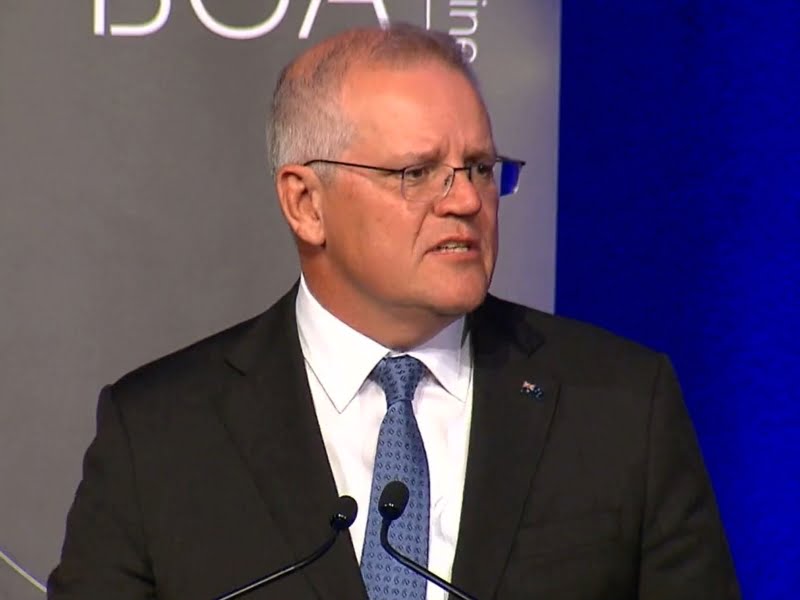The federal government will spend $500 million on “enhancing” myGov and My Health Record as part of a $1.2 billion funding package aiming to position digital at the centre of Australia’s economy.
Prime Minister Scott Morrison on Thursday morning announced the significant spending, which will feature in next week’s federal budget. The new money is on top of the $1 billion provided in the October budget six months ago.
The funding package also includes new spending for the Consumer Data Right, digital skills training, tech graduates programs and an expansion of the Cyber Security Skills Partnership Innovation Fund.

In announcing the funding package, Mr Morrison emphasised the prominent role the digital economy will play in Australia’s recovery from the COVID-19 pandemic.
“Over the course of COVID-19 we saw the rapid escalation of the digital elements of our economy become a reality, and as a government we’re seeking to take hold of that momentum and ensure that continues to propel us forward,” Mr Morrison told the media.
“The digital economy is central to our government’s economic plan. Digital transformation is central to Australia’s economic plan and securing our economic recovery.”
The bulk of the funding – $308.1 million – will be going towards “enhancing” My Health Record, the controversial electronic health record which was made opt-out in early 2018.
The funding will be used to add support for COVID-19 testing and vaccinations, connecting Residential Aged Care Facilities and improving telehealth and emerging virtual healthcare initiatives.
Through My Health Record, Australians will be able to access their COVID-19 test results and immunisation status, and receive alerts about the vaccines.
Just over $200 million will be going towards improvements to myGov, in an effort to make the platform a “simpler and more tailored experience for Australians based on their preferences and interactions”.
Early last year the government began a program to develop a new version of myGov to initially run alongside the existing platform and eventually replace it, with an aim of providing a user experience more in-line with private sector offerings.
Deloitte has completed the bulk of this work and a beta version of the new myGov was launched last year. The consulting giant has been paid nearly $35 million so far for this work. The government appointed a Systems Integrator Panel late last year for further work on the revamped myGov, but is still yet to publicly reveal which companies are part of this.
While not mentioning the new myGov prototype or wider program, the government fact sheet on the program mentions many of the elements this project involves, including making the myGov service more personalised, an improved service dashboard and document upload functionality, and a digital assistant.
Another major funding item is $111.3 million to “accelerate” the rollout of the Consumer Data Right (CDR), following frustrations over the slow progress in the banking sector, the first implementation of the initiative.
The government will also look to ensure the CDR is interoperable with international schemes, as recommended by a recent fintech inquiry report.
This money will go towards developing the rules and standards for the energy sector, which will be launched next year, to assess and designate telecommunications firms and to conduct a strategy assessment for a roadmap to roll out the CDR to the wider economy.
The $1.2 billion digital spend has been broadly welcomed by the sector.
The Australian Information Industry Association (AIIA) welcomed the announcement, saying it is a “good start”.
“We applaud the federal government’s recognition that this transformation is not merely a national one but a global one that is happening. The AIIA has been calling out our need to keep pace with the global trend,” AIIA CEO Ron Gauci said.
“The investment of $1.2 billion is recognition of the fact that the ICT sector is at the heart of every industry and the federal government must continue to invest in this sector to secure our economic independence for years to come.”
Australia Investment Council chief executive Yasser El-Ansary also supported the package, saying it will “significantly propel innovation and technology that will drive increased productivity in every sector of the economy”.
Industry group DIGI, whose members include Facebook and Google, worked on the strategy as part of the Digital Experts Advisory Committee.
“This major investment in digital skills, and emerging industries and technologies, show that the government sees the incredible enabling impact of technology economy-wide. If Australia caught up with the growth rate of other tech-leading countries internationally, the technology sector could be contributing $207 billion per year to GDP by 2030,” DIGI said in a statement.
Other funding in the package include $10.7 million for a Digital Skills Cadetship Trial, which will provide work-based opportunities for digital jobs.
“This aims to deliver digital skills in a more flexible and timely way, through a four-to-six month cadetship comprising formal training with on-the-job learning. The government will work with industry to trial the design and delivery of tailored training to meet employers’ digital skills requirements, coupled with on-the-job experience provided by host employers,” the government fact sheet said.
The government will be establishing a Next Generation Emerging Tech Graduates Program with $22.6 million over six years, which will fund more than 200 competitive national scholarships in areas of emerging technology.
The Cyber Security Skills Partnership Innovation Fund will also be expanded with an extra $43.89 million, on top of the $26.5 million provided in last year’s Cyber Security Strategy.
For SMEs, the budget will allocate $12.7 million to facilitate independent advice for business owners to help build digital capabilities, with up to 17,000 SMEs to access the services.
More than $30 million of the package will be going towards securing future connectivity using 5G and 6G mobile networks, and improving standards for trusted digital identities, while $15.3 million has been allocated for electronic invoicing.
The post Govt unveils $1.2B digital package appeared first on InnovationAus.
This post was originally published on InnovationAus.